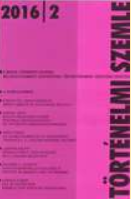„…ki fog felelet terhével tartozni, a Tekintetes Úr kétség kívül tudni méltóztatik” - Kossuth Lajos és a sátoraljaújhelyi kolerabizottság tagjainak kollektív lemondása 1831-ben
„…Who Will Be Constrained by the Burden of Responsibility, Your Respectable Lordship Certainly Knows Well”. Lajos Kossuth and the Collective Resignation of the Sátoraljaújhely Cholera Committee in 1831
Author(s): Krisztián BodnárSubject(s): Health and medicine and law, Family and social welfare, 19th Century
Published by: Magyar Tudományos Akadémia Bölcsészettudományi Kutatóközpont Történettudományi Intézet
Keywords: Lajos Kossuth; Collective Resignation of the Sátoraljaújhely Cholera Committee; 1831;
Summary/Abstract: While among the events which took place in Zemplén county in the year 1831, the cholera pandemic and the connected peasant riots are well known, another episode, interesting from the perspective of Kossuth’s biography, has attracted far less scholarly attention: it is the collective resignation of the cholera committee established at Sátoraljaújhely, and their consequent reassumption of office. The first part of the study is thus a historiographical survey, which demonstrates that the majority of scholars have failed to explore the archival documents, and instead willingly exposed themselves to the influence of Kossuth’s selfnarratives. Most of the contemporaries thought that the prime mover behind the collective resignation was Kossuth. The author accordingly examines whether this view can be justified, and addresses three related questions: did the committee in fact operate as an organized opposition group? Can the case be interpreted as a means of exerting pressure? And finally, what means did the committal authorities, and before all the first vice-ispán, the pro-Habsburg László Dókus, have at their disposal to handle the problem? It can be stated that the group in question consisted of nobles with roughly similar family backgrounds, and several among them were active as opposition public figures. Although the leading role of Kossuth cannot be demonstrated beyond doubt, on the basis of his previous activities his dominant influence over the course of events can be surmised. Yet the case can also be seen from the perspective of the reluctance of the committee members to assume the functions they were expected to discharge, their failure to tolerate popular discontent, and also the temporal relocation of the county authorities from Sátoraljaújhely to nearby Velejte. The resignation and the related conflicts can consequently be explained by several reasons, and the collective departure itself is open to a number of different interpretations.
Journal: Történelmi Szemle
- Issue Year: 2016
- Issue No: 02
- Page Range: 303-314
- Page Count: 12
- Language: Hungarian

